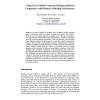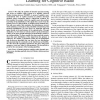140 search results - page 9 / 28 » Learning Hierarchical Performance Knowledge by Observation |
GECCO
2004
Springer
14 years 26 days ago
2004
Springer
To create a realistic environment, some simulations require simulated agents with human behavior pattern. Creating such agents with realistic behavior can be a tedious and time con...
HCI
2009
13 years 5 months ago
2009
Social annotation systems such as SparTag.us and del.icio.us have been designed to encourage individual reading and marking behaviors that, when shared, accumulate to build collect...
CORR
2011
Springer
12 years 11 months ago
2011
Springer
Imitation can be viewed as a means of enhancing learning in multiagent environments. It augments an agent’s ability to learn useful behaviors by making intelligent use of the kn...
CORR
2008
Springer
13 years 7 months ago
2008
Springer
We study the problem of dynamic spectrum sensing and access in cognitive radio systems as a partially observed Markov decision process (POMDP). A group of cognitive users cooperati...
ICRA
2005
IEEE
14 years 1 months ago
2005
IEEE
— Imitation is a powerful mechanism for transferring knowledge from an instructor to a na¨ıve observer, one that is deeply contingent on a state of shared attention between the...


